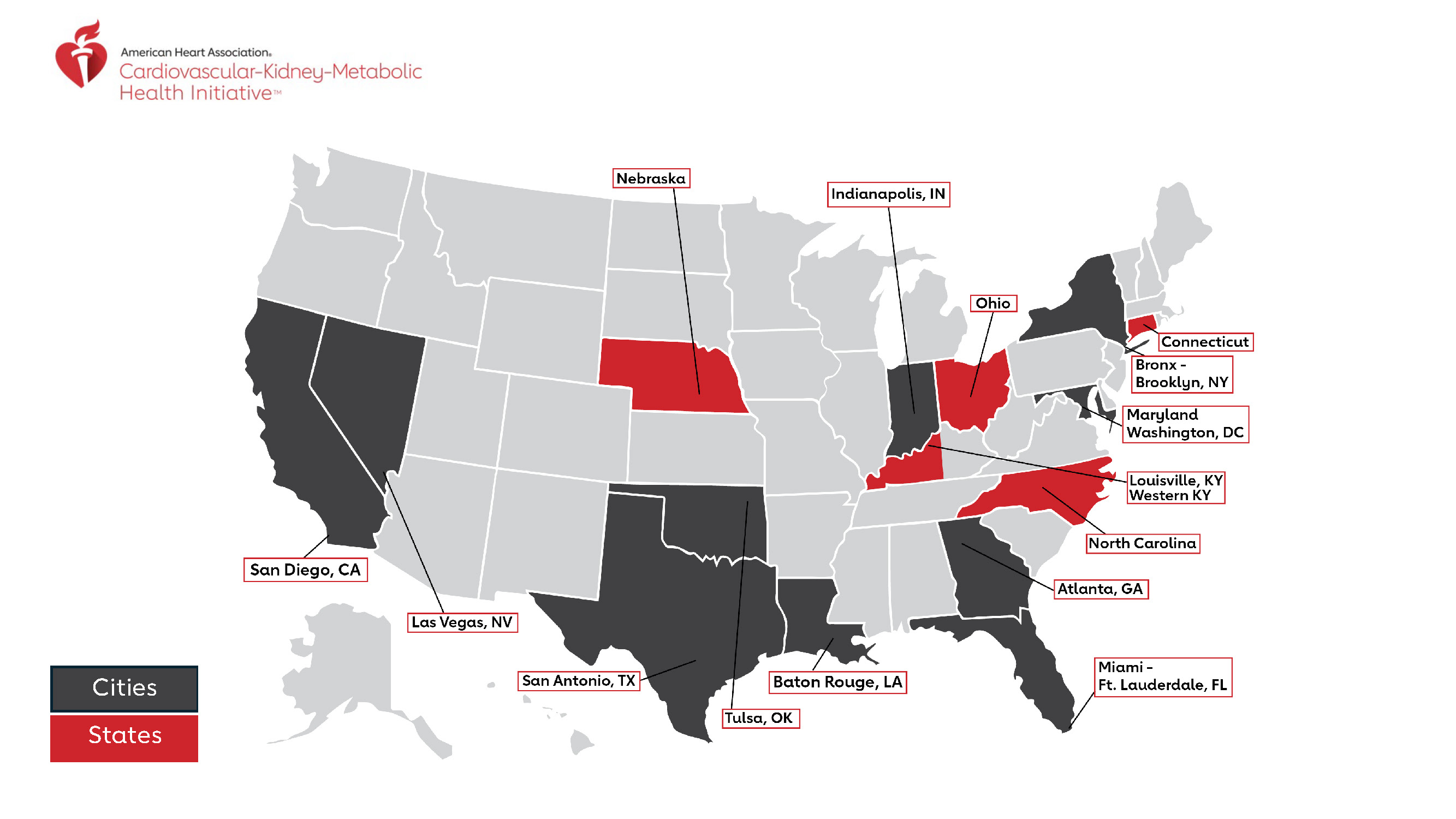
 (NewMediaWire) - July 28, 2025 - DALLAS — People in 15 regions across the U.S. will soon benefit from the American Heart Association’s Cardiovascular-Kidney-Metabolic Health Initiative™, designed to improve treatment of the interconnected conditions that lead to heart disease and stroke. The initiative began with five regions in February and has now expanded to include the final 10 regions. The regions include states, cities and metro areas.
(NewMediaWire) - July 28, 2025 - DALLAS — People in 15 regions across the U.S. will soon benefit from the American Heart Association’s Cardiovascular-Kidney-Metabolic Health Initiative™, designed to improve treatment of the interconnected conditions that lead to heart disease and stroke. The initiative began with five regions in February and has now expanded to include the final 10 regions. The regions include states, cities and metro areas.
The initiative, supported by founding sponsors Novo Nordisk and Boehringer Ingelheim, supporting sponsor Novartis Pharmaceuticals Corporation and champion sponsor DaVita, will enroll 150 health care sites across the 15 regions, impacting the care of more than a quarter-million patients. It was created to increase awareness, screening and treatment for a combination of conditions known as cardiovascular-kidney-metabolic (CKM) syndrome. Healthcare organizations who join the initiative will be recognized as “CKM Health Groundbreakers.”
The American Heart Association, a global force changing the future of health for all, defines CKM syndrome as the combined health effects of heart disease, kidney disease, diabetes and obesity, which puts people at high risk for heart attack, stroke and heart failure. Risk factors include high blood pressure, abnormal cholesterol, high blood glucose (sugar), impaired kidney function and high body mass index or waist circumference.
The first regions were Atlanta metro; Baton Rouge metro; San Diego metro; Washington, D.C. and Maryland; and Ohio. The following regions have been added:
- Bronx and Brooklyn, New York
- Connecticut
- Indianapolis, Indiana
- Las Vegas, Nevada
- Louisville and western Kentucky
- Miami and Ft. Lauderdale, Florida
- Nebraska
- North Carolina
- San Antonio, Texas
- Tulsa, Oklahoma
These areas were selected based on disease prevalence, local health system characteristics and distinctive community features like population size and demographic mix.
The risk factors that contribute to CKM syndrome are interconnected. When one part of the body isn’t working well, it can worsen the others and raise the risk of heart disease or stroke. Rising rates of risk factors and generally low levels of CKM health — just 10% of U.S. adults have excellent CKM health — have led clinical and scientific experts to declare CKM syndrome a public health emergency as articulated in an American Heart Association presidential advisory.
“While there is public health urgency around CKM syndrome, we also have a great opportunity to improve CKM health,” said Chiadi Ndumele, M.D., Ph.D., M.H.S., FAHA, an American Heart Association volunteer and chair of the initiative’s advisory group. “We have more knowledge about the interconnections among health factors and new therapies that positively impact CKM health. Through this initiative, we aim to establish a model of care that ensures evidence-based therapies are consistently provided to those with CKM conditions.”
The initiative includes guidance for collaboration among specialists and other health care professionals to help streamline care and make connections with community resources for people with health-related social needs – such as transportation limitations or help paying for prescriptions.
“There’s a need to move beyond individual specialists to collaborative care models that support more holistic patient care,” said Ndumele who is also an associate professor of medicine and director of obesity and cardiometabolic research in the division of cardiology at Johns Hopkins University in Baltimore, MD. “It’s important for health care providers and organizations to think about these conditions collectively, because that’s how patients experience them.”
More about CKM health is at heart.org/myCKMhealth.
Health care organizations can download the CKM Health Implementation Guide for free.
Additional Resources:
- Multimedia is on the right column of the release link.
- Spanish news release
- Must-know facts for women about heart, kidney and metabolic health (May 2025)
- Rise in kidney disease underscores critical heart-kidney connection (March 2025)
- Heart disease could hit up to 28 years sooner for people with CKM syndrome (Nov. 2024)
- Follow AHA/ASA news on X @HeartNews
###
The American Heart Association/American Stroke Association receives funding primarily from individuals; foundations and corporations (including pharmaceutical, device manufacturers and other companies) also make donations and fund specific Association programs and events. The Association has strict policies to prevent these relationships from influencing the science content. Revenues from pharmaceutical and biotech companies, device manufacturers and health insurance providers and the Association’s overall financial information are available here.
About the American Heart Association
The American Heart Association is a relentless force for a world of longer, healthier lives. Dedicated to ensuring equitable health in all communities, the organization has been a leading source of health information for more than one hundred years. Supported by more than 35 million volunteers globally, we fund groundbreaking research, advocate for the public’s health, and provide critical resources to save and improve lives affected by cardiovascular disease and stroke. By driving breakthroughs and implementing proven solutions in science, policy, and care, we work tirelessly to advance health and transform lives every day. Connect with us on heart.org, Facebook, X or by calling 1-800-AHA-USA1.
For Media Inquiries: 214-706-1173
Maggie Francis: Maggie.Francis@heart.org
For Public Inquiries: 1-800-AHA-USA1 (242-8721)
heart.org and stroke.org
